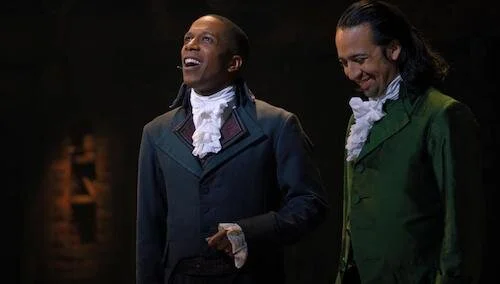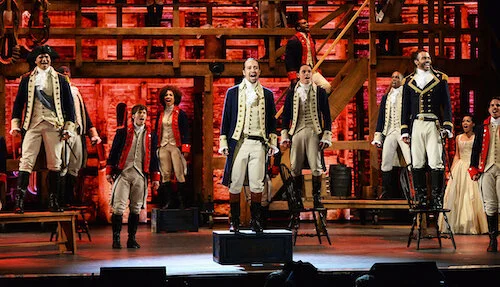Hamilton
Some music and theatrical production films (or documentaries, as they can be considered) truly capture the event that they are featuring. One that comes to mind is the Jonathan Demme masterpiece Stop Making Sense, which put together the sprawling live show of Talking Heads during their prime; there may never be a better concert film than this one. Point is Hamilton — a recording of the beloved stage production — achieves such a goal. Having never seen Hamilton, I have felt unfortunate to this topic of discussion for ages. While I was not a part of the masses fixated with this musical within a live setting, I feel like this viewing in my living room was the next best thing.
If anything, Thomas Kail (who is familiar with both film and stage, particularly Hamilton itself) manages to focus on so many of the tiny details that add up in Hamilton on the big (well, small) screen. Like the flurry of lyrical wordplays that the production boasts, the visual story is just as nuanced, and this documentation of it does a sterling job of highlighting them all. When Hamilton was announced for a super early release on Disney+ (over a year ahead of its October 2021 slot), I forgot that it was a recording of the live show. Deep down, I had hoped for an actual adaptation. After watching this sensational film (it still is a film no matter what), there may be virtually nothing more that an adaptation could do to better this production.
As is, Hamilton is exactly as it should be, and no amount of pausing in between shots, camera angles, and other cinematic techniques can strengthen it beyond its current state (it’s a stage sensation for a very clear reason). If anything, the only things that separate this from, say, West Side Story, is that the camera rarely breaks past the 180º marks (if it does, it’s very briefly, as to not expose the audience during the performance), and that Hamilton is performed seemingly all at once (there’s actually three shows spliced together here), and not over the course of a shooting schedule (nor is there much post production enhancement, outside of shot selection through editing, and production enhancement on the audio recording, which never hurts). A number of musical adaptations try to mimic being on the stage again (just in a cinematic setting), so Hamilton taking this route is hardly alien. It’s what many features have tried to achieve, and it pulled this goal off literally just by existing mostly as is (sometimes, the most basic route is the best route).
Aaron Burr and Alexander Hamilton.
So, let’s get into the story of the ten dollar bill Founding Father Alexander Hamilton, whose life is told in this play (and now film). Of course, not everything in Hamilton (of any nature) is factually accurate, including the omission of his part in the Native American genocide or his family’s owning of slaves (much of this is covered in The Haunting of Lin-Manuel Miranda). The casting of performers of many races and cultures is a means of replicating Hamilton’s stance on immigration (Hamilton himself was born in Nevis), and a way of telling America’s history with America’s present. I’m five years late to the party, so I don’t believe I’m breaking any sort of ground in saying that Hamilton in any form is an educational starting point at most, and not the entire lesson one should cling on to. Perhaps it is a misconception that Hamilton is even meant to be educational at all, despite its effortless abilities to convey information in an engaging way. I would say Lin-Manuel Miranda and company just wanted to depict the entirety of America in a tale of yesteryear, and that works well enough already.
To fulfil this mandate, the music of Hamilton is — as we all know by now — a mixture of traditional Broadway tunes and lyrical-miracle rapping. There isn’t a single ounce of dialogue that is merely spoken. I’ve brought up this type of musical before, especially in a film like Cats (that’s where our comparisons end), but Hamilton is an example of this method done extremely well. With every song hitting their mark (not a single melody is even close to mediocre), and with the variety created between singing and rapping (let’s not forget the many sublime musical pivots mid song), I not once wished for something to just be spoken. Then, Hamilton gets creative, with battle rapping replacing political debates, record scratches representing shake ups, and narrative call backs created by reprises (and all of these call backs are plays-on-words or nagging reminders of who these characters once were). Musically, Hamilton does not miss a single step; then again, this is old news, given how often the soundtrack has been played virtually everywhere since 2015.
A wide shot of the production.
Hamilton does as much as it can to bring the stage experience to your home, and it’s nearly perfect. The only thing missing — which is impossible to deliver — is the intimacy of moments where you might see a vulnerable side of Hamilton. The film does its best by exploring close up shots whenever necessary, so you can’t say that Kail and company didn’t try. It’s evident that some efforts won’t completely fulfil what they set out to do, but Hamilton comes damn close. I feel like I have felt the excitement, exhilaration, and passion of the live show just without noticing the humidity caused by audience bodies, the ear ringing of nearby ecstatic applause, and the other small things that render the theatre experience unlike any other. Still, Hamilton achieved everything else. Besides, in 2020, this is as much interaction with people as many of us have had in months.
Alexander and Eliza Hamilton.
It no longer seems strange that a recording of a play could be one of the finest films of the year, because 2020 has given us far stranger things to deal with. Hamilton is so well crafted enough that even this recording is hard to compete with. If anything, putting an acclaimed production onto a streaming service is the kind of thing that makes complete sense in 2020. You can create your own intermission time. If you want to revisit a crazy moment or double take a small detail, you can rewind ten seconds ahead of time (believe me, I did this often). You can put this on whenever you see fit to. At last, Hamilton’s brilliance is no longer just a secret amongst those who could go see it (or their word-of-mouth either). Almost anyone can see what this production is all about for themselves. A nearly three hour acrobatic display of verbal prowess, vocal range, choreographed complexity, social self awareness, and finer finishing touches. It’s a constant wave of jaw dropping, side splitting, eye watering triumphs. Despite its length, it feels like it ends as soon as it begins. For the many households that are thankful for this release, there’s one last strength that this streamable film has going for it: the ability to replay it.
Andreas Babiolakis has a Masters degree in Film and Photography Preservation and Collections Management from Ryerson University, as well as a Bachelors degree in Cinema Studies from York University. His favourite times of year are the Criterion Collection flash sales and the annual Toronto International Film Festival.









